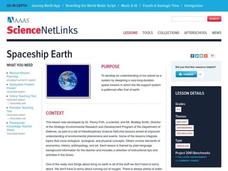PHET
Planetary Magnetism
What do magnetic fields look like? The best way to learn about magnetic fields is to try identifying them for yourself. Scholars will understand the importance of magnetic fields after completing this experiment. The extension activities...
California Academy of Science
Kinesthetic Astronomy: Birthday Stars
Space explorers take a virtual trip around the sun right within your classroom! They stand in a circle facing away from the "sun" (a lamp) in the center of the room. As they move according to your instructions, they view different...
California Academy of Science
Kinesthetic Astronomy: Mars Opposition Dance
Your class will watch as one child orbits the sun as Earth, while another orbits as Mars. If the timing is right, they will see the repetitive dance between the two planets and discover how often they are opposite from each other. For...
Magic of Physics
Planetary Rescue Squad
Ready, aim ... learn! Increase scholars' understanding of force, mass, distance, and angle using an engaging interactive. Pupils participate in a series of rescue missions where they launch supplies at a target with an adjustable cannon....
PHET
Planet Designer: What’s Trending Hot?
Excite scholars to design their own planet in this first of five lessons. The lesson starts with a pre-activity assessment, a complete lesson plan that is easy to implement, and a post-activity assessment that would look great...
Curated OER
Modeling the Solar System
Students build a scaled model of the solar system. In this space science lesson, students arrange them according to their distances from the sun. They analyze each planet's unique features such as density and relative gravity.
Curated OER
Gelatin Volcanoes
Students investigate magma flow using gelatin volcano models. For this earth science lesson, students sketch the magma bodies as observed from the top of their model. They explain why magma moves that way.
PBS
Analyzing Light Curves of Transiting Exoplanets
Scientists detected exoplanets by measuring how the brightness of stars changed over time. Young astronomers interpret and analyze the same data that led to exoplanet discoveries. They learn to apply light curve graphs and connect the...
Laboratory for Atmospheric and Space Physics
Orbit Simulator
Researchers think they have evidence of a new planet deep in our solar system that is the size of Neptune and orbits the sun far beyond Pluto. The orbit simulator shows the orbits of our well-known planets, as well as Pluto and the comet...
Curated OER
Investigating the Biosphere With Planetary Models
Students create a biosphere using the computer program SImEarth. They work in small groups to create "Daisyworld" in which they model aspects of the Gaia hypothesis. They form a question to answer and choose variables to investigate in...
Curated OER
Rover Races
Students identify the challenges encountered by astronauts in operating a planetary rover. In this space science lesson, students create a rover using their team members. They follow a command sequence from the driver and navigate...
Curated OER
Impact Craters: Holes in the Ground!
Students simulate crater formation through a lab activity. In this space science lesson, students calculate how much energy is transferred during meteorite impact. They identify different factors affecting the size and depth of craters...
Curated OER
Good Vibrations Remote Sensing data Collection: Thermal Emission Spectrometer
The Mars Global Surveyor spent two years creating a mineral map of the planet Mars using thermal emission spectrometry. To help young astronomers understand this remote sensing instrument, have them simulate how data is collected and...
Curated OER
The Great Planetary Debate
Pupils' are given a research sheet to complete in small groups. They are to select a planet or moon to research using the Internet. With this research and their completed form, each group defends their planet or moon in a debate...
Curated OER
Solar Relatives
Students examine the solar system by creating a model representation. In this space science instructional activity, students research our solar system and the distances between planets. Students create a model solar system in...
Curated OER
Planetary Tourism
Young scholars pretend they are the first student to be allowed in space. They examine all nine planets on their journey. They complete a KWL chart and worksheets before they do their research. They create an itinerary of their tour and...
University of Colorado
Great Red Spot Pinwheel
The great red spot on Jupiter is 12,400 miles long and 7,500 miles wide. In this sixth part of a 22-part series, individuals model the rotation of the Great Red Spot on Jupiter. To round out the activity, they discuss their findings as a...
Curated OER
Spaceship Earth
Students develop an understanding of our planet as a system by designing a very-long-duration space mission in which the life-support system is patterned after that of earth.
Curated OER
Changing Faces: A Study of Solar and Planetary Rotation Rates
Pupils determine rotation rates of a variety of solar system objects using images and the Internet.
Curated OER
Comet Encounters
Students create glitter-covered comet models. Then they make large outdoor chalk drawings of the solar system and place their comets at the location of the Kuiper belt. They carry their comets around an orbit of the sun, shaking various...
Curated OER
The Seasons
Discover the change of the seasons by modeling the Earth-Sun system. Learners model the orbit of the Earth around the sun and explore how and why the patterns of winter and summer occur.
Curated OER
Galaxies Galore, Games and More
Students practice skills used in scientific investigation while studying the three main types of galaxies. Students identify Earth as part of Milky Way galaxy, the parts of galaxies, and the types of galaxies, as well as classify...
Curated OER
Physicists or Philosophers?
Trace the sequential process of the developing theories of atomic structure in the early 20th century, show, in historical development, how scientists "know" things, how experiments are set up and how interpretations are drawn from them,...






















